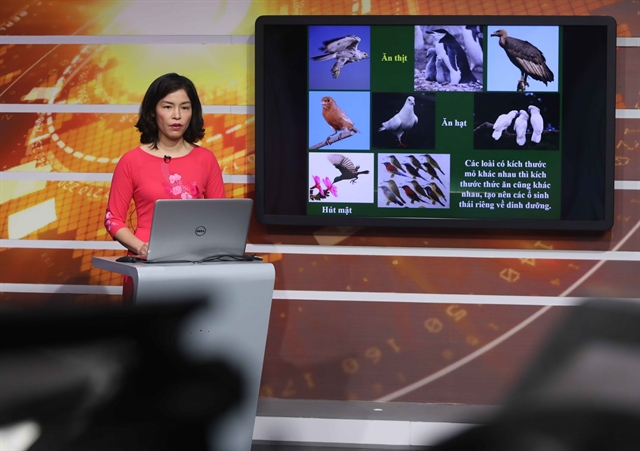 Society
Society


|
| Lessons for secondary and high school students are broadcasted on Hà Nội Television while schools are closed due to COVID-19. — VNA/VNS Photo Thanh Tùng |
HÀ NỘI — The Ministry of Education and Training has allowed education departments to cut curricula taught in primary, secondary and high schools due to the prolonged school closure caused by the COVID-19 pandemic.
According to schemes the ministry announced at the beginning of the 2019-2020 school year, primary students in Việt Nam would go to school for at least 35 weeks, while secondary and high school students go to school for at least 37 weeks. However, students nationwide had just finished about 20 weeks before the Tết (Lunar New Year) holidays which fell in late January. Schools were then kept closed due to the COVID-19 pandemic.
Responding to the school closure, in the middle of last month, the ministry decided that this school year would end by July 15 and the national high school graduation exam would be held from August 8 to August 11, about a month and a half later than normal.
This is the first time students in Việt Nam have experienced such a long school closure due to a communicable disease, so the education and training ministry had decided to cut teaching programmes.
The ministry said that schools would not test students over knowledge in the removed parts, while students are encouraged to self-study these topics.
According to the circular the ministry issued on Tuesday, local education departments could remove part of the official teaching programmes recommended by the ministry.
The removed contents are in the subjects of Geography, Technology, Citizenship Education, Literature, Maths, Physics, Chemistry, Biology, Computing and Foreign Languages – English, Russian, Japanese, French or Chinese.
Secondary schools can adjust contents and forms of teaching in Art, Music and Physical Education to fit their conditions.
The curriculum for primary school students would also be shortened with fewer lessons to teach in nine subjects: Maths, Vietnamese, Technology, Morality, Natural and Social Sciences, History and Geography, Music, Craft and Physical Education.
The removed contents are mostly those that are designed for advanced level or practical application. Some lessons are shifted to optional or for students to self-study.
The ministry highlighted that schools should assess the ability of their teachers and students to adjust the content of Vietnamese lessons, ensuring that after the first grade, students can read and write in Vietnamese.
Once schools reopen after the pandemic is brought under control, students will not need to attend lessons that require them to observe outdoor environments or come into contact with animals.
For lessons that require students to experiment in groups, the teachers will conduct the experiments in front of the whole class or simple experiments will be provided for students to do at home.
The ministry also planned that in the early days of the next school year 2020-2021, schools will focus on reviewing old lessons for students. — VNS